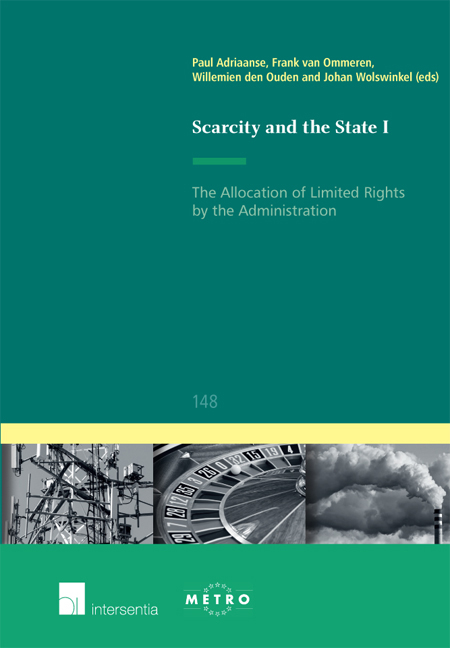Book contents
- Frontmatter
- Foreword
- Editors’ Preface
- Contents
- Part I General Perspectives
- Part II Eu Law Perspectives
- Chapter 6 Requirements under EU Law on the Allocation of Scarce European Subsidies
- Chapter 7 Τhe Allocation of Limited Authorisations under EU Internal Market Rules
- Chapter 8 The Need for Optimal Choice: Exploring a Hierarchy between Allocation Procedures for Limited Authorisations under EU Law
- Chapter 9 The Influence of EU State Aid Law on the Allocation of Limited Rights by National Authorities
- Chapter 10 Allocation of Limited Rights from a European Public Procurement Law Perspective
- Chapter 11 The Allocation of Limited Licences by the Administration – Requirements under the European Fundamental Right to Property
- Part III Comparative Law Perspectives
- List of Contributors
- Ius Commune Europaeum
Chapter 8 - The Need for Optimal Choice: Exploring a Hierarchy between Allocation Procedures for Limited Authorisations under EU Law
from Part II - Eu Law Perspectives
Published online by Cambridge University Press: 22 September 2018
- Frontmatter
- Foreword
- Editors’ Preface
- Contents
- Part I General Perspectives
- Part II Eu Law Perspectives
- Chapter 6 Requirements under EU Law on the Allocation of Scarce European Subsidies
- Chapter 7 Τhe Allocation of Limited Authorisations under EU Internal Market Rules
- Chapter 8 The Need for Optimal Choice: Exploring a Hierarchy between Allocation Procedures for Limited Authorisations under EU Law
- Chapter 9 The Influence of EU State Aid Law on the Allocation of Limited Rights by National Authorities
- Chapter 10 Allocation of Limited Rights from a European Public Procurement Law Perspective
- Chapter 11 The Allocation of Limited Licences by the Administration – Requirements under the European Fundamental Right to Property
- Part III Comparative Law Perspectives
- List of Contributors
- Ius Commune Europaeum
Summary
Introduction
If the number of authorisations available for grant has been limited to a maximum, these ‘limited authorisations’ need to be granted by means of an ‘allocation procedure’ in which applications are being compared with each other. Among the most well-known allocation procedures are the auction, the comparative assessment (‘beauty contest’), the lottery and allocation in order of receipt of the allocations (‘first come, first served’). It should be clear from the outset that the chosen allocation procedure might have important consequences for the final outcome of the allocation.
The issue of the (optimal) choice of the allocation procedure can be approached from among various disciplines and, within the discipline of law, from among various perspectives. This chapter explores whether EU law contains any preferences for allocation procedures or criteria to be applied and, if so, on which grounds. An example of such a preference might be that an auction is being preferred to a lottery. Th us, there might exist some kind of hierarchy between allocation procedures: some allocation procedures are considered ‘better’ than other allocation procedures from the perspective of EU law.
In order to unveil this possible hierarchy between allocation procedures from an EU law perspective, this chapter will first provide for some conceptual preliminaries necessary to understand the idea of a hierarchy between allocation procedures (Section 2). Next, this chapter will identify so-called ‘baseline’ requirements, i.e. minimal requirements that all allocation procedures should satisfy (Section 3). This chapter will then examine whether additional requirements can be imposed on allocation procedures. To that end, Section 4 adopts a bottom-up approach, identifying preferences for specific allocation procedures in sector-specific EU legislation. Complementarily, Section 5 will discuss whether EU law also provides for general guidance as to the choice of allocation procedures. In that respect, the areas of internal market law (fundamental freedoms), competition law and state aid law will be distinguished. Finally, the conclusion will discuss to what extent there exists some hierarchy between allocation procedures from the perspective of EU law (Section 6).
Conceptual Preliminaries
In order to clarify the line of reasoning to be followed in this chapter, some central terms need to be defined in advance.
- Type
- Chapter
- Information
- Scarcity and the StateThe Allocation of Limited Rights by the Administration, pp. 187 - 218Publisher: IntersentiaPrint publication year: 2016



